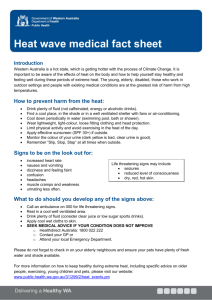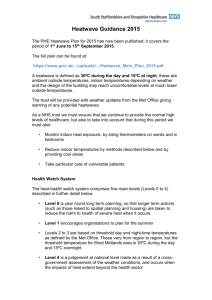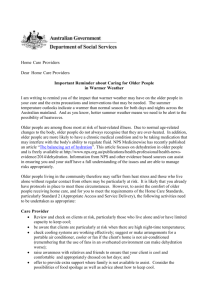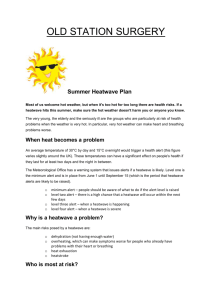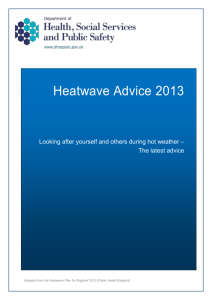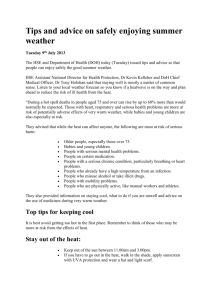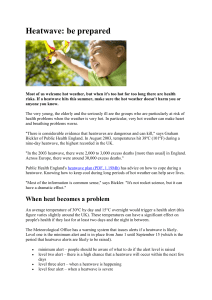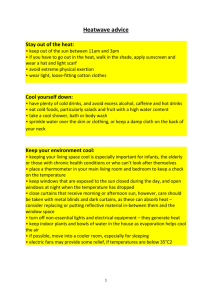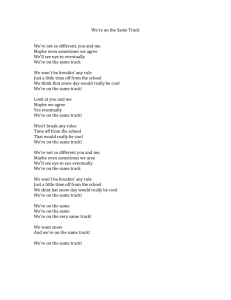Advice for staying well during a heatwave
advertisement
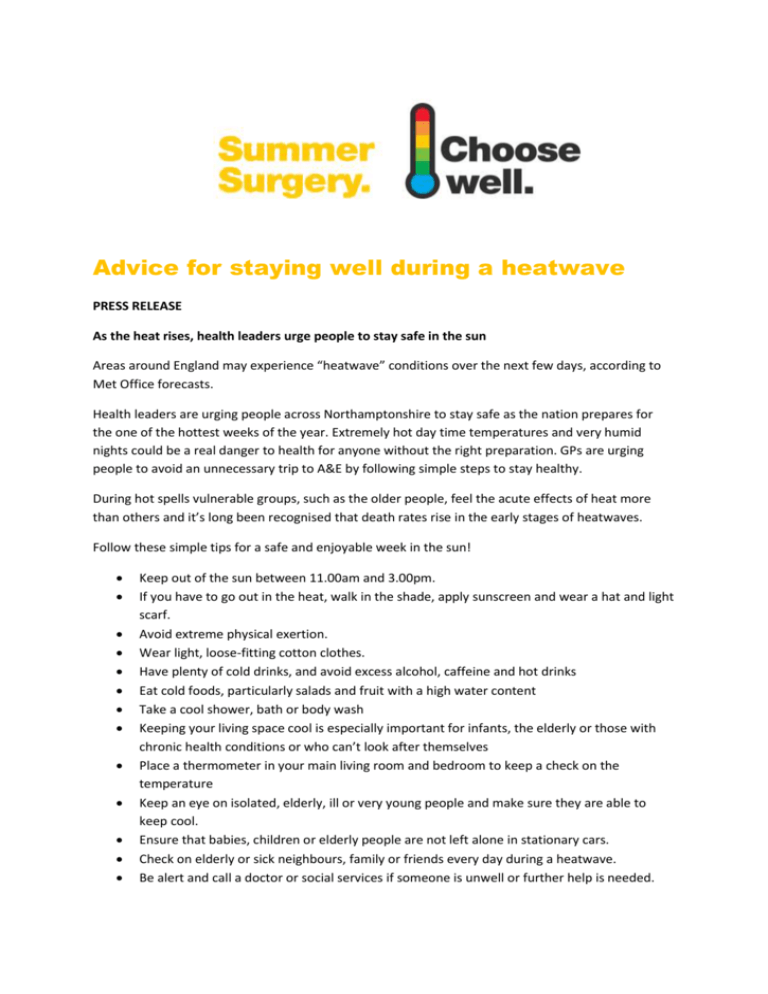
Advice for staying well during a heatwave PRESS RELEASE As the heat rises, health leaders urge people to stay safe in the sun Areas around England may experience “heatwave” conditions over the next few days, according to Met Office forecasts. Health leaders are urging people across Northamptonshire to stay safe as the nation prepares for the one of the hottest weeks of the year. Extremely hot day time temperatures and very humid nights could be a real danger to health for anyone without the right preparation. GPs are urging people to avoid an unnecessary trip to A&E by following simple steps to stay healthy. During hot spells vulnerable groups, such as the older people, feel the acute effects of heat more than others and it’s long been recognised that death rates rise in the early stages of heatwaves. Follow these simple tips for a safe and enjoyable week in the sun! Keep out of the sun between 11.00am and 3.00pm. If you have to go out in the heat, walk in the shade, apply sunscreen and wear a hat and light scarf. Avoid extreme physical exertion. Wear light, loose-fitting cotton clothes. Have plenty of cold drinks, and avoid excess alcohol, caffeine and hot drinks Eat cold foods, particularly salads and fruit with a high water content Take a cool shower, bath or body wash Keeping your living space cool is especially important for infants, the elderly or those with chronic health conditions or who can’t look after themselves Place a thermometer in your main living room and bedroom to keep a check on the temperature Keep an eye on isolated, elderly, ill or very young people and make sure they are able to keep cool. Ensure that babies, children or elderly people are not left alone in stationary cars. Check on elderly or sick neighbours, family or friends every day during a heatwave. Be alert and call a doctor or social services if someone is unwell or further help is needed. If you have a health condition, keep medicines below 25 °C or in the refrigerator (read the storage instructions on the packaging). Seek medical advice if you are suffering from a chronic medical condition or taking multiple medications. If you or others feel unwell, try to get help if you feel dizzy, weak, anxious or have intense thirst and headache; move to a cool place and rest as soon as possible and measure your body temperature. Dr Darin Seiger, GP and Chair and Nene CCG said “People can enjoy the sun without putting their health at risk. Take sensible precautions including avoiding the sun at the hottest time of the day and taking on lots of water to stay well in the heat. Keep young children out of the sun and protect them with high factor sun cream if they are exposed to the sun. There are lots of options that mean you can avoid an unnecessary trip to A&E. Remember, your local pharmacy can offer advice about common illnesses and over the counter remedies and NHS 111 can offer urgent medical care over the telephone. They will assess your condition and direct you the appropriate service if necessary. Extreme heat can also put older and frail people in danger so I would urge people to keep a closer eye on vulnerable neighbours to make sure they are well hydrated.” Health and social care workers should regularly check on vulnerable patients, share sun safety messages, make sure room temperatures are set below 26 degrees and ensure patients have access to cold water and ice. Social media messages Social media: Use #ukheatwave #HeatHealthWatch Stay out of the heat: The sun is the hottest between 11am and 3pm. If you have to go out in the heat, wear UV sunglasses, preferably wraparound, to reduce UV exposure to the eyes, walk in the shade, apply sunscreen of at least SPF15 with UVA protection, and wear a hat and light scarf. Wear light, loose-fitting cotton clothes. This should minimise the risk of sunburn avoid extreme physical exertion. Stay hydrated: Have plenty of cold drinks, and avoid excess alcohol, caffeine and hot drinks. Eat cold foods, particularly salads and fruit with a high water content. Keep your environment cool: Keeping your living space cool is especially important for infants, older people or those with long-term health conditions or who can’t look after themselves. A thermometer in your main living room and bedroom will help you keep a check on the temperature. Keep windows that are exposed to the sun closed during the day, and open windows at night when the temperature has dropped, although be aware of security issues especially in ground floor rooms. Close curtains that receive morning or afternoon sun. However, care should be taken with metal blinds and dark curtains, as these can absorb heat – consider placing reflective material between them and the window space. Look out for others: Keep an eye on isolated, older people, ill or very young people and make sure they are able to keep cool. Ensure that babies, children or older people are not left alone in stationary cars. Look out for others: Check on older people or sick neighbours, family or friends every day during a heatwave. Be alert and call a doctor or social services if someone is unwell or further help is needed. Seek medical advice if you are suffering from a long-term medical condition or taking multiple medications. If you feel dizzy, weak, and anxious or have intense thirst and headache, move to a cool place as soon as possible. Drink some water or fruit juice to rehydrate avoid alcohol and caffeinated drinks like tea or coffee. If you have painful muscular spasms (particularly in the legs, arms or abdomen, for example after sustained exercise during very hot weather), rest immediately in a cool place and drink electrolyte drinks. Medical attention is needed if heat cramps last more than one hour. Consult your doctor if you feel unusual symptoms or if symptoms persist The key messages for communicating with those fasting during Ramadan are: If you start to feel unwell, disoriented or confused, or collapse or faint, advice is to stop fasting and have a drink of water or other fluid. This is especially important for older adults, those with poorly controlled medical conditions such as low/high blood pressure, diabetes and those who are receiving dialysis treatment The Muslim Council of Britain has confirmed that breaking fast in such conditions is allowable under Islamic law. Also make sure to check on others in the community who may be at greater risk and keep an eye on children to ensure they are having a safe and healthy Ramadan Health professional key messages: Health and social care workers in the community, hospitals and care homes are advised to regularly check on vulnerable patients. Share sun safety messages with staff and patients Make sure room temperatures are set below 26°C Ensure patients have access to cold water and ice Ensure medicines are stored in a cool place Keep up to date with Met Office forecasts and prepare accordingly. Health and social care workers in the community, hospitals and care homes are advised to regularly check on vulnerable patients Review and prioritise people at high risk Ensure sufficient staffing Work closely with the voluntary and community sector to help reduce vulnerability and to support the planning and response to heatwaves Communicate alerts to staff and make sure that they are aware of heatwave plans Turn off unnecessary lights/equipment Ensure buildings are kept cool at night Ensure discharge planning takes home temperatures and support into account Be aware that plastic pads and mattresses can be particularly hot during a heatwave Advise residents to avoid caffeine (coffee, tea, colas), very sweet drinks and alcohol Communicate public media messages – especially to “hard to reach” vulnerable groups
